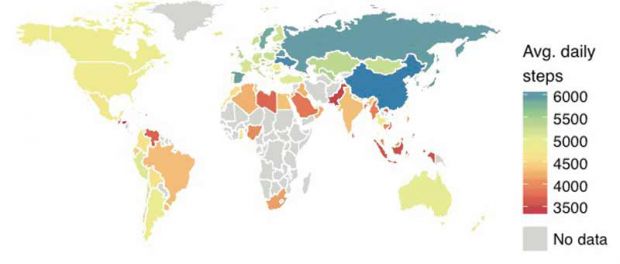The Most Active People In The World Are...
It’s not the British, but you probably already guessed that

People in Hong Kong take more daily steps on average than people in any other country in the world, racking up 6,880 a day, according to Stanford University research that analysed data from smartphones.
The research found that the least active country of those measured was Indonesia, where people managed a paltry 3,513 steps a day on average. The UK’s average step count was 5,444.
RECOMMENDED: Why 10,000 Steps A Day Is An Excellent Target
Stanford scientists used anonymised data from over 700,000 people in 111 countries who used the activity-tracking app Argus to compile the research, but drew their conclusions mostly from the 46 countries that provided at least 1,000 users.

Image credit: Tim Althoff, via Stanford News
Those conclusions provide some insights into obesity, which was linked to a country’s “activity inequality”. This refers to the size of the gap between the most active and least active people in a given country.
Activity inequality was found to be more closely linked with a country’s obesity levels than the overall average. For example, Mexico and the US had similar overall average step counts, but the activity inequality and overall obesity levels are higher in America.
Get the Coach Newsletter
Sign up for workout ideas, training advice, reviews of the latest gear and more.
The research also found that in countries where there are high levels of active inequality, it is driven by large differences between men and women.
"When activity inequality is greatest, women's activity is reduced much more dramatically than men's activity, and thus the negative connections to obesity can affect women more greatly,” said computer scientist Dr Jure Leskovec, who led the Stanford research team.
The research also gave 69 cities in the US a walkability rating to see how that affected activity. Unsurprisingly pedestrian-friendly cities like New York showed higher average steps counts than cities with a low walkability rating like Houston, but how walkable a city was also affected activity inequality – more walkable cities had lower levels of activity inequality. When a city is set up for people to walk in it, everyone walks more. Much like a baseball pitch for ghosts – if you build it, they will come.
Nearly 70% of adults in developed countries and almost 50% of adults in developing countries now carry smartphones, which use accelerometers to track your step count. This opens up new frontiers for research into activity on a grand scale. We’ll just have to trust that all that data is being used for good, or stop ticking those terms and condition boxes without reading them.

Nick Harris-Fry is a journalist who has been covering health and fitness since 2015. Nick is an avid runner, covering 70-110km a week, which gives him ample opportunity to test a wide range of running shoes and running gear. He is also the chief tester for fitness trackers and running watches, treadmills and exercise bikes, and workout headphones.
